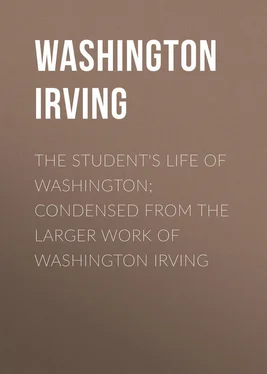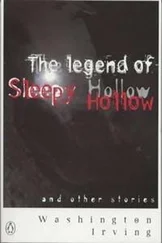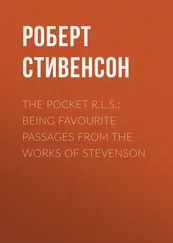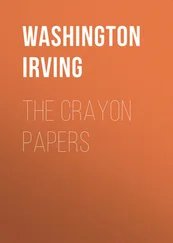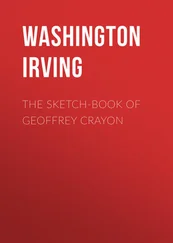Washington Irving - The Student's Life of Washington; Condensed from the Larger Work of Washington Irving
Здесь есть возможность читать онлайн «Washington Irving - The Student's Life of Washington; Condensed from the Larger Work of Washington Irving» — ознакомительный отрывок электронной книги совершенно бесплатно, а после прочтения отрывка купить полную версию. В некоторых случаях можно слушать аудио, скачать через торрент в формате fb2 и присутствует краткое содержание. Издательство: Иностранный паблик, Жанр: literature_19, foreign_antique, foreign_prose, на английском языке. Описание произведения, (предисловие) а так же отзывы посетителей доступны на портале библиотеки ЛибКат.
- Название:The Student's Life of Washington; Condensed from the Larger Work of Washington Irving
- Автор:
- Издательство:Иностранный паблик
- Жанр:
- Год:неизвестен
- ISBN:нет данных
- Рейтинг книги:3 / 5. Голосов: 1
-
Избранное:Добавить в избранное
- Отзывы:
-
Ваша оценка:
- 60
- 1
- 2
- 3
- 4
- 5
The Student's Life of Washington; Condensed from the Larger Work of Washington Irving: краткое содержание, описание и аннотация
Предлагаем к чтению аннотацию, описание, краткое содержание или предисловие (зависит от того, что написал сам автор книги «The Student's Life of Washington; Condensed from the Larger Work of Washington Irving»). Если вы не нашли необходимую информацию о книге — напишите в комментариях, мы постараемся отыскать её.
The Student's Life of Washington; Condensed from the Larger Work of Washington Irving — читать онлайн ознакомительный отрывок
Ниже представлен текст книги, разбитый по страницам. Система сохранения места последней прочитанной страницы, позволяет с удобством читать онлайн бесплатно книгу «The Student's Life of Washington; Condensed from the Larger Work of Washington Irving», без необходимости каждый раз заново искать на чём Вы остановились. Поставьте закладку, и сможете в любой момент перейти на страницу, на которой закончили чтение.
Интервал:
Закладка:
Washington occupied his seat in the House of Burgesses, when, on the 29th of May, the stamp act became a subject of discussion. Among the Burgesses sat Patrick Henry, a young lawyer who had recently distinguished himself by pleading against the exercise of the royal prerogative in church matters, and who was now for the first time a member of the House. Rising in his place, he introduced his celebrated resolutions, declaring that the General Assembly of Virginia had the exclusive right and power to lay taxes and impositions upon the inhabitants, and that whoever maintained the contrary should be deemed an enemy to the colony. The speaker, Mr. Robinson, objected to the resolutions, as inflammatory. Henry vindicated them, as justified by the nature of the case; went into an able and constitutional discussion of colonial rights, and an eloquent exposition of the manner in which they had been assailed.
The resolutions were modified, to accommodate them to the scruples of the speaker and some of the members, but their spirit was retained. The Lieutenant-governor (Fauquier), startled by this patriotic outbreak, dissolved the Assembly, and issued writs for a new election; but the clarion had sounded.
Washington returned to Mount Vernon full of anxious thoughts inspired by the political events of the day, and the legislative scene which he witnessed. His recent letters had spoken of the state of peaceful tranquillity in which he was living; those now written from his rural home show that he fully participated in the popular feeling, and that while he had a presentiment of an arduous struggle, his patriotic mind was revolving means of coping with it. In the meantime, from his quiet abode at Mount Vernon, he seemed to hear the patriotic voice of Patrick Henry, which had startled the House of Burgesses, echoing throughout the land, and rousing one legislative body after another to follow the example of that of Virginia. At the instigation of the General Court or Assembly of Massachusetts, a Congress was held in New York in October, composed of delegates from Massachusetts, Rhode Island, Connecticut, New York, New Jersey, Pennsylvania, Delaware, Maryland, and South Carolina. In this they denounced the acts of Parliament imposing taxes on them without their consent, and extending the jurisdiction of the courts of admiralty, as violations of their rights and liberties as natural born subjects of Great Britain, and prepared an address to the king, and a petition to both Houses of Parliament, praying for redress. Similar petitions were forwarded to England by the colonies not represented in the Congress.
The very preparations for enforcing the stamp act called forth popular tumults in various places. In Boston the stamp distributor was hanged in effigy; his windows were broken; a house intended for a stamp office was pulled down, and the effigy burnt in a bonfire made of the fragments. In Virginia, Mr. George Mercer had been appointed distributor of stamps, but on his arrival at Williamsburg publicly declined officiating. It was a fresh triumph to the popular cause. The bells were rung for joy; the town was illuminated, and Mercer was hailed with acclamations of the people. The 1st of November, the day when the act was to go into operation, was ushered in with portentous solemnities. There was great tolling of bells and burning of effigies in the New England colonies. At Boston the ships displayed their colors but half-mast high. Many shops were shut; funeral knells resounded from the steeples, and there was a grand auto-da-fe, in which the promoters of the act were paraded, and suffered martyrdom in effigy. At New York the printed act was carried about the streets on a pole, surmounted by a death's head, with a scroll bearing the inscription, "The folly of England and ruin of America."
These are specimens of the marks of popular reprobation with which the stamp act was universally nullified. No one would venture to carry it into execution. In fact no stamped paper was to be seen; all had been either destroyed or concealed. All transactions which required stamps to give them validity were suspended, or were executed by private compact. The courts of justice were closed, until at length some conducted their business without stamps. Union was becoming the watch-word. The merchants of New York, Philadelphia, Boston, and such other colonies as had ventured publicly to oppose the stamp act, agreed to import no more British manufactures after the 1st of January unless it should be repealed. So passed away the year 1765.
The dismissal of Mr. Grenville from the cabinet gave a temporary change to public affairs. The stamp act was repealed on the 18th of March, 1766, to the great joy of the sincere friends of both countries, still, there was a fatal clause in the repeal, which declared that the king, with the consent of Parliament, had power and authority to make laws and statutes of sufficient force and validity to "bind the colonies, and people of America, in all cases whatsoever." As the people of America were contending for principles, not mere pecuniary interests, this reserved power of the crown and Parliament left the dispute still open, and chilled the feeling of gratitude which the repeal might otherwise have inspired. Further aliment for public discontent was furnished by other acts of Parliament. One imposed duties on glass, pasteboard, white and red lead, painters' colors, and tea; the duties to be collected on the arrival of the articles in the colonies; another empowered naval officers to enforce the acts of trade and navigation. Another wounded to the quick the pride and sensibilities of New York. The mutiny act had recently been extended to America, with an additional clause, requiring the provincial Assemblies to provide the troops sent out with quarters, and to furnish them with fire, beds, candles, and other necessaries, at the expense of the colonies. The Governor and Assembly of New York refused to comply with this requisition as to stationary forces, insisting that it applied only to troops on a march. An act of Parliament now suspended the powers of the governor and Assembly until they should comply.
Boston continued to be the focus of what the ministerialists termed sedition. The General Court of Massachusetts, not content with petitioning the king for relief against the recent measures of Parliament, especially those imposing taxes as a means of revenue, drew up a circular, calling on the other colonial Legislatures to join with them in suitable efforts to obtain redress. In the ensuing session, Governor Sir Francis Bernard called upon them to rescind the resolution on which the circular was founded, – they refused to comply, and the General Court was consequently dissolved. The governors of other colonies required of their Legislatures an assurance that they would not reply to the Massachusetts circular – these Legislatures likewise refused compliance, and were dissolved. All this added to the growing excitement.
Nothing, however, produced a more powerful effect upon the public sensibilities throughout the country than certain military demonstrations at Boston. [In consequence of repeated collisions between the people of that place and the commissioners of customs, two regiments of troops were sent from Halifax to overawe the disaffected citizens. It was resolved in a town meeting that the king had no right to send troops thither without the consent of the Assembly. The selectmen accordingly refused to find quarters for the soldiers, and while some encamped on the common, others were quartered, to the great indignation of the public, in Faneuil Hall.]
Throughout these public agitations, Washington endeavored to preserve his equanimity. Still he was too true a patriot not to sympathize in the struggle for colonial rights which now agitated the whole country, and we find him gradually carried more and more into the current of political affairs. A letter written on the 5th of April, 1769, to his friend, George Mason, shows the important stand he was disposed to take. In the previous year the merchants and traders of Boston, Salem, Connecticut and New York, had agreed to suspend for a time the importation of all articles subject to taxation. Similar resolutions had recently been adopted by the merchants of Philadelphia. Washington's letter is emphatic in support of the measure. "At a time," writes he, "when our lordly masters in Great Britain will be satisfied with nothing less than the deprivation of American freedom, it seems highly necessary that something should be done to avert the stroke, and maintain the liberty which we have derived from our ancestors."
Читать дальшеИнтервал:
Закладка:
Похожие книги на «The Student's Life of Washington; Condensed from the Larger Work of Washington Irving»
Представляем Вашему вниманию похожие книги на «The Student's Life of Washington; Condensed from the Larger Work of Washington Irving» списком для выбора. Мы отобрали схожую по названию и смыслу литературу в надежде предоставить читателям больше вариантов отыскать новые, интересные, ещё непрочитанные произведения.
Обсуждение, отзывы о книге «The Student's Life of Washington; Condensed from the Larger Work of Washington Irving» и просто собственные мнения читателей. Оставьте ваши комментарии, напишите, что Вы думаете о произведении, его смысле или главных героях. Укажите что конкретно понравилось, а что нет, и почему Вы так считаете.
